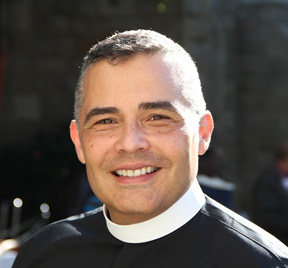Question: We suddenly found ourselves empty nesters when our last child decided to move to another state for college. Although she had several options locally and could have lived at home, she is happy with her choice.
Our house seems so empty. We both volunteer in several organizations around town, but that doesn’t seem to help the empty feeling. I told my husband we could foster or adopt animals. We already have one aging dog. He’s not very keen on doing this. I also suggested we could be foster parents for a child. We’re in our early 50s and I think we have what it takes to love a child. He doesn’t like that idea either.
Of these two things I’ve thought of, I like the idea of fostering or adopting a dog. I would like help in convincing him to take some action with me – something that can give us both a new lease on life. By the way, I’m the one making suggestions and, although I’ve asked him, he hasn’t come up with anything. ~ Down in the Dumps
Dear Down in the Dumps,
Does your husband want to die? I am being facetious, of course, but if he wants to retire to doing nothing, he will not live very long. You said you are only in your 50s so you and he probably haven’t retired yet, and so death is a long way off – probably.
Neither my wife nor I have retired – and we don’t plan to! We enjoy what we do and, as long as we have our health, we will continue doing what we like and getting paid for it.
But back to you: good for you, says my wife the therapist, in wanting to do something useful! She says we need to feel useful as we age, and you obviously want to contribute and do something useful.
If your husband isn’t excited about fostering dogs, how about rescuing one from a local dog pound? My wife’s cousin’s wife (got that? wife’s cousin’s wife!) fosters cats. Since you already have a dog, maybe cats wouldn’t be a good fit for you.
But it is good that you want to do something with the rest of your life. My own parents volunteered after their four kids left the nest, and it was good for them as well as for those they helped. And you aren’t “simply parents.” What I mean is that your life is more than simply raising kids. When that part of your life is over there is a lot of other good you can do and good that is “fun” to do. I hope your husband can find something for the next chapter in his life. You obviously have, whether he participates or not!

The Rev. C. L. “Skip” Lindeman
lindemanskip@yahoo.com
Dear Down in the Dumps,
Finding oneself a new empty nester can be one of the more painful and difficult life span development stages for many. One of the first things I recommend when a person is faced with this is volunteering and/or learning a new skill. Perhaps that means picking up a hobby that you never had the time to enjoy while raising your children.
The desire to take care of someone or something is a normal part of this developmental stage, especially for women. Your conundrum is that your husband is his own person and may have different feelings and needs of his own during this season. Perhaps he views this time as long awaited freedom and does not want the responsibility of having to care for, or be tied down by, new responsibilities.
It is important to empower yourself and know that there are so many diverse ways for you to get your own needs met that do not involve permanent or long term commitments. Your love of caring and nurturing others is a valuable skill in our world. Perhaps you could consider doing nursery care for a local church or midweek Bible study. Another option is to volunteer caring for animals. There are many non-profits – for example, the Humane Society – that would welcome your time. You could be trained to care for service animals or, even taking this further, you could add the ability to take these animals to hospitals and other venues to see children or adults who would be greatly blessed by the gesture. The list is endless. This is a unique time in your life to be trained to do something fresh that uses your desire to demonstrate your care.
There is also the chance that, as time passes, your husband’s own desires change and the time comes for the both of you to add a new family member to your home.
In the meantime, create new memories, take adventures with your husband, respect his wishes and honor your own! Go out and help care for young children or animals. Who knows? You might just find a new passion that could even become a career you enjoy.
Be patient with your husband. If you find this issue becomes a problem between you two, you can always go to a few sessions of couples therapy to come to a mutually satisfying compromise.
In the meantime, find joy in being young and design a new chapter in your life that fulfills you – and others.

Rev. Kimberlie Zakarian
kimberlie.zakarian@gmail.com
Question: Is there something in ourselves that knows when we’re ready to die? I have a life-long friend I’ve known since kindergarten. I love her like a sister. We’re now in our 60s and she has been told that her liver is failing. She is on a list for a liver transplant, but she’s way down on the list. When we talk she tells me that maybe this is her time to go and of course I don’t want to believe that.
She’s a wonderful wife, mother and grandmother and is a volunteer for two organizations. Is there a way to encourage her to want to live and not give up because it seems as though she is giving up. We also both attend the same church where she sings in the choir. ~ Worried Friend
Dear Worried Friend,
Your question is a very intriguing one. While I do believe that it is possible for people to have a sense of when they are going to die, my experience tells me that it is more likely that by talking about their own demise, saying they are “ready” to die, they are attempting to lessen their fear of dying, which increases their level of acceptance. Your friend has had a scary medical diagnosis and it sounds like she is coping with that by accepting her mortality, although she is doing so by giving up on living a wonderful and fulfilling life in the time that she has left.
In the Bible, (Matthew 24:36), Jesus talks about seeing the signs that point to the end of our days, and said, “But of that day and hour, no one knows, not even the angels of Heaven, but My Father only.”
Your friend truly does not have any way of knowing when, why, where or how she will die. None of us do. What we do know is that our job here is to focus on loving and living.
Dr. Ernest Holmes, author of the seminal New Thought book, “The Science of Mind,” said “And so, we prepare not to die, but to live.”
Every moment in our physical bodies, with our loved ones and friends, is precious. Cutting ourselves off from our lives in preparation for death is not the answer. Cutting ourselves off from love so that we won’t feel the pain of loss is not the answer either. I suggest you encourage your friend to enjoy every moment as a gift. Show her, by your joyous example, that you are both here to sing, laugh, love and be grateful. I believe that each of us is an eternal spiritual being and that this physical body is a temporary home. Death is simply a doorway to our greater expression of life.
As Maya Angelou said, “Life is not measured by the number of breaths we take, but by the moments that take our breath away.”

karen@karenmitchellmusic.com
Dear Worried Friend,
Your friend is blessed to have someone like you in her life who genuinely cares about her well-being. In response to your question, I wish I had an answer but I don’t. I have heard that when the time comes some people have wonderful experiences seeing bright lights in the room, seeing loved ones who have gone before and even talking to them. Some experts in palliative care say that within 72 hours of someone’s passing they start sharing metaphors about going on trips, like going shopping, or packing their bags, or talking about having their tickets available.
David Kessler, former chair of the Hospital Association of Southern California Palliative Care Transitions Committee, said, “The notion of the dying preparing for a journey isn’t new or unusual.” Also, according to medical experts, a person who is close to dying loses their appetite, sleeps excessively, has difficulty waking up, gets very tired, loses interest in socializing, experiences confusion and has changes in their vital signs. However, others say that science has been no more accurate of predicting when we are going to die than a $10 fortuneteller!
All of these experiences and signs of passing away occur within days or hours of someone passing and, from what you are sharing, your friend is not even close to that point.
When we die is one of those mysteries of our Christian tradition because nobody knows when the time will come. Even Jesus said, “But about that day or hour no one knows, neither the angels in heaven, nor the Son, but only the Father.” (Mark 13:32, NRSV) What your friend may be experiencing is the disappointment from knowing that she is down the list in her most viable option to address her condition. She may also be sad and concerned about leaving behind – and grieving – loved ones with whom she would love to spend more time. The best you can do for your friend at this time is to continue being that friend that you have always been, the one who listens deeply and attentively, the one who gives her encouragement, the one that she knows will always be there for her. Tell her that you love her, let her know that you’ll be okay when she transitions, tell her how your life is better because of her and make her laugh. Let her know that, although you don’t like this, you both are going to make the best of your time together. Go back through memory lane and talk about all of the wonderful moments in her life, look at pictures, laugh, cry, relive them all. I also invite you to continue praying for her, asking God to grant her a pain-free life until the time for her to go comes.
Until that day that nobody knows when grant her the great gift of your company and your friendship.

Rev. Antonio Gallardo
agallardo@stlukeslacrescenta.org
